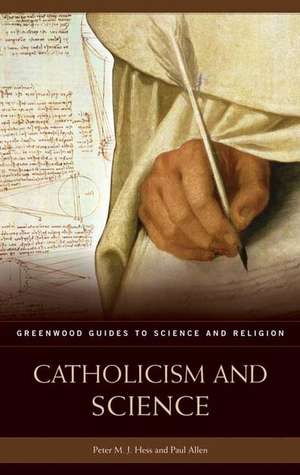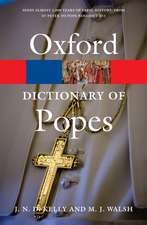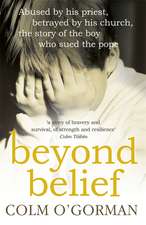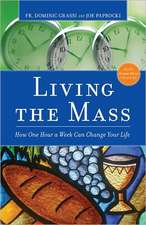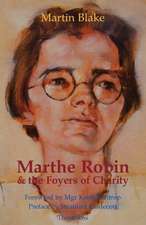Catholicism and Science: Greenwood Guides to Science and Religion
Autor Peter M.J Hess, Dr Paul L. Allenen Limba Engleză Hardback – 29 mar 2008 – vârsta până la 17 ani
Preț: 275.92 lei
Preț vechi: 477.54 lei
-42% Nou
Puncte Express: 414
Preț estimativ în valută:
52.80€ • 55.38$ • 43.95£
52.80€ • 55.38$ • 43.95£
Carte tipărită la comandă
Livrare economică 01-15 aprilie
Preluare comenzi: 021 569.72.76
Specificații
ISBN-13: 9780313331909
ISBN-10: 0313331901
Pagini: 272
Dimensiuni: 156 x 235 x 27 mm
Greutate: 0.57 kg
Editura: Bloomsbury Publishing
Colecția Greenwood
Seria Greenwood Guides to Science and Religion
Locul publicării:New York, United States
ISBN-10: 0313331901
Pagini: 272
Dimensiuni: 156 x 235 x 27 mm
Greutate: 0.57 kg
Editura: Bloomsbury Publishing
Colecția Greenwood
Seria Greenwood Guides to Science and Religion
Locul publicării:New York, United States
Notă biografică
PETER M.J. HESS serves as Faith Project Director with the National Center for Science Education (NCSE), and as adjunct professor at Saint Mary's College, Moraga, California. He is a member of the International Society for Science and Religion, and has worked for both the Metanexus Institute and the Center for Theology and the Natural Sciences. His scholarly work focuses on the historical interaction between religion and the sciences. He is on the editorial board of the series.PAUL L. ALLEN is Assistant Professor in Theological Studies at Concordia University in Montreal, Quebec.
Cuprins
Series ForewordPrefaceAcknowledgmentsChronology of Eventschapter 1.Introduction to Science in the Catholic TraditionIntroduction: "Catholicism" and "Science"The Heritage of the Early ChurchNatural Knowledge in the Patristic EraScience in the Early Middle Ages: Preserving FragmentsThe High Middle Ages: The Rediscovery of Aristotle and Scholastic Natural PhilosophyLater Scholasticism: Exploring New AvenuesConclusion: From Late Scholasticism into Early Modernitychapter 2.From Cosmos to Unbounded Universe: Physical Sciences from Trent to Vatican IIntroductionThe Reformations of the Sixteenth CenturyThe Unmaking of the Medieval Cosmos: Copernicus Revises the HeavensThe Conservative Origins of a RevolutionHumanism and the Foundation of the Lyncean AcademyFoundations of the Modern Worldview: GalileoCatholicism and Science in the Aftermath of GalileoCatholicism and the Physical Sciences in the Seventeenth CenturyThe Popes and Science in the Nineteenth CenturyCatholicism and Physical Science: Three Models of InteractionConclusion: A Diversity of Approaches in Cosmology and Religionchapter 3.From the Garden of Eden to an Ancient Earth: Catholicism and the Life and Earth SciencesIntroductionNatural History before EvolutionEnlightenment Awakenings to the History of Earth and LifeCardinal Newman: Science in Catholic Thought at Mid-CenturyEarly Vatican Reactions to DarwinismSt. George Jackson Mivart: Evolution in Theistic PerspectiveEvolution and Religion: Germany and FranceEnthusiastic Appropriation: The Case of John Augustine ZahmStudied Rejection of Darwinism: Martin S. BrennanA Progressive View from the American Hierarchy: Bishop John L. SpaldingGenetics and Mendel the MonkConclusion: From the Garden of Eden to Mendel's Garden of Peaschapter 4.Catholicism and Science at Mid-Twentieth CenturyIntroductionCatholicism and the Natural Sciences in the 1922-1965 PeriodThomism before Vatican IIPapacy and DoctrineThe Pontifical Academy of SciencesGeorges LemaîtreTeilhard de ChardinVatican II and ScienceJohn Paul II and Conclusionchapter 5.The Legacy of Vatican II in Cosmology and BiologyIntroductionHans KüngWilliam Stoeger and George CoyneKenneth MillerMichael BeheJean LadrièreErnan McMullinJohn HaughtBernard LonerganStanley JakiThomas Berry, Edward Oakes, Elizabeth Johnson, and Joseph BrackenConclusionchapter 6.Catholicism, Neuroscience, and GeneticsIntroduction: Science and EthicsBioethics, Personhood, and LifeCatholicism, Emergentism, and Brain ScienceCatholicism, Genetic Science, and Original SinConclusionPrimary SourcesGlossaryBibliographyIndex
Recenzii
Catholicism and Science is an outstanding reference resource. It is authoritative and mostly free from bias. The entries are well written, with enough detail for deeper understanding yet not overwhelming as many works on theology, philosophy, and science can be. The illustrations are appropriate, and each entry has a list of works cited for further research. The index is useful for locating information quickly, and the extensive bibliography provides even more suggestions for further research. It is highly recommended for academic libraries supporting theology, science, and philosophy programs. Larger public libraries might also find it useful.
